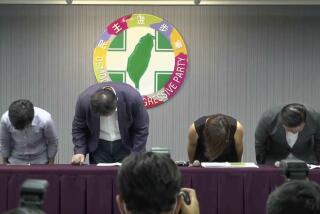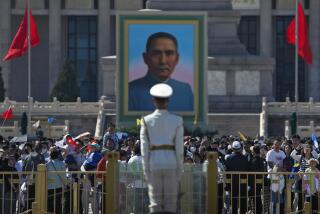Spreading Internet rumors in China can mean jail time under new rules
- Share via
BEIJING -- Spreading rumors on the Internet could get you three years in prison in China, with the penalties rising if the rumor is reposted more than 500 times or viewed by more than 5,000 people.
So says a judicial interpretation issued Monday by China’s Supreme People’s Court and Procuratorate, the first nationwide ruling of its kind.
The Chinese Communist Party has waged campaigns against rumors for years, but this is the first time existing laws against defamation and instigating instability have been formally extended to the Internet.
“In recent years, the Internet has been used to maliciously fabricate facts and damage the reputation of others … and to concoct rumors that mislead the people, causing serious disruptions of social order and even mass incidents,” said Supreme Court spokesman Sun Jungong in a statement that was read live on television to maximize its effect.
Under the Chinese system, a judicial interpretation is the equivalent of a Supreme Court ruling and carries great weight. The ruling immediately drew concern from free speech advocates who have been worried about a wave of arrests of prominent microbloggers on Sina Weibo, the wildly popular website that is billed as the Chinese equivalent of Twitter.
“This is the first time the government has clarified what is illegal on the Internet,’’ said Liu Xiaoyuan, a prominent human rights lawyer in Beijing. “Before, there were rules governing pornography, but they had not addressed the issue of free speech on the Internet.”
Chinese censors routinely remove content they deem offensive or sensitive -- postings that criticize the Communist Party or leadership, or deal with Tibet or dissident activity – but they often cannot keep up with the flood of information.
Among those swept up in a new crackdown on rumors in recent weeks are Charles Xue, a U.S. citizen with 12 million followers on Sina Weibo who regularly reposts microblogs from activists. He was charged with soliciting prostitution.
Also arrested was a 28-year-old microblogger who had exposed official corruption by examining published photographs of officials wearing luxury watches. Others were arrested for questioning the achievements of Lei Feng, an early Communist hero who is an iconic figure in the party’s propaganda about altruism.
The Chinese state press has joined in the campaign in recent weeks against rumors spread by the Internet.
“Greater responsibility necessary for greater freedom online,” was the title of one recent editorial on the official Xinhua news service.
A government-backed “rumor monitoring” group last week released a list of what it called the top 10 rumors circulated by the Internet this year. Among them was a report that a soup was being sold in southern Guangdong province cooked from babies’ bodies. Another was a report on flooding in China that used a photograph from the Philippines.
Lawyers who read the judicial interpretation said that in order for somebody to be punished, it should be proven that they knew the rumor was false and that they distributed it with malice.
The penalties would not apply to reports in the mainstream press that later prove false. For example, early Sunday morning, Xinhua reported that the international Olympic committee had chosen Istanbul as the site of the 2020 summer Olympics. In fact, it was Tokyo that was chosen.
“They will not be dealing with errors on official sites,’’ said lawyer Liu.
ALSO:
Kerry presses case for Syria strike, reaffirms bond with Britain
Egypt wages major offensive against Islamists in Sinai Peninsula
Dennis Rodman arrives in China from North Korea without Kenneth Bae
Twitter: @BarbaraDemick
More to Read
Sign up for Essential California
The most important California stories and recommendations in your inbox every morning.
You may occasionally receive promotional content from the Los Angeles Times.










